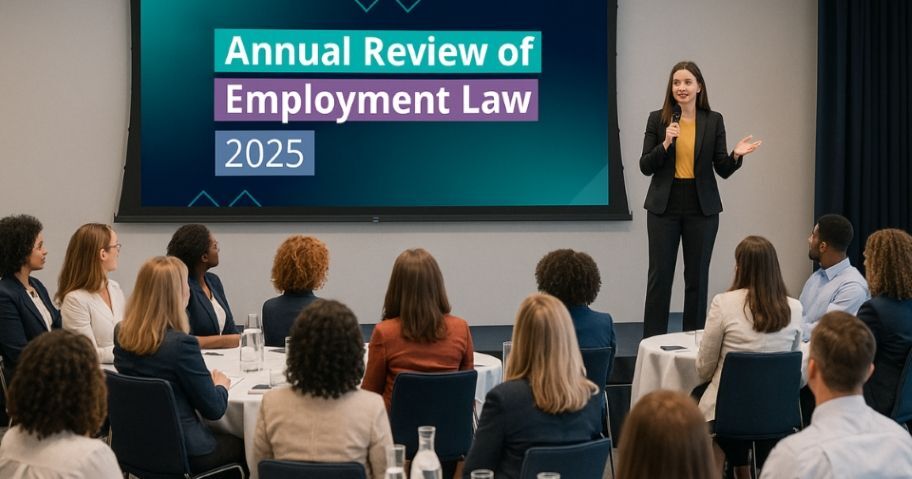
Christine, Julie, and Laura - known as the Knowledge Team - bring extensive expertise in employment law, HR, and learning & development. With diverse backgrounds spanning top-tier law firms, in-house roles, and voluntary organisations across the UK and Ireland, they provide informed and strategic support on employment matters.
Our team includes qualified (now non-practising) employment solicitors with experience in both legal and corporate sectors, alongside an experienced HR professional and CIPD Associate Member, ensuring a well-rounded approach to workplace challenges.
Lughnasadh is here. It's all about the harvest and trust us, these employment law updates are ripe for the picking 🌾😉
Grab a brew and get stuck into this week’s Top 5 reads ☕
- Ireland is now leading the way on remote work jobs – great news for flexible working! 🏢
- Top tips for leaders handling redundancies – a tough but important topic. 🤝
- A Dublin school has denied misleading the WRC, with the case drawing plenty of attention. 🏫
- Irish professionals are putting in more overtime than ever due to heavy workloads. ⏱️
- Don’t miss our latest HR Interview Series with Seána McCreesh – full of great insights. 🎤
And in other news...Simmons & Simmons is growing its Dublin employment practice with the exciting acquisition of CC Solicitors 🎉 We’re thrilled that Partner, Bernadette Daly will be joining us at this year’s Annual Review of Employment Law to share her insights on negotiated exits ✨ More here
**If you have any difficulties accessing the article or resetting your password (if you haven’t already done so in 2025) please email hub@legal-island.com and we’ll be in touch with you as soon as possible.**
CONTENTS ⚓︎
1. Case Law Reviews ⚓︎
Kevin Carton v CTS Projects Ltd ADJ-00054691
Summary: The WRC found that employee was unfairly dismissed by his employer as his selection for redundancy was influenced by a prior disagreement with a manager rather than genuine business reasons.
Practical Guidance for Employers:
Employers should:
- Exercise care when selecting employees for redundancy to ensure the process is objective, transparent, and not influenced by unrelated factors such as personal disagreements or past disciplinary actions. All decisions should be based on genuine business needs and supported by clear documentation to demonstrate a fair and consistent approach.
- Where temporary lay-off is used, clearly communicate that this is a short-term measure and that redundancy will only be considered if the situation persists. If an employee claims redundancy under the Redundancy Payments Acts during lay-off, employers must assess whether the claim is valid and be cautious not to retrospectively justify termination for unrelated reasons.
- Ensure internal communications, including emails or informal messages, are carefully managed. All staff in managerial roles should be trained to maintain professionalism in communication.
Read the full Review here:
Kevin Carton v CTS Projects Ltd
Beata Kowalska v Securispeed Logistics Limited ADJ-00055757
Summary: The WRC found that an employee’s claim for unpaid sick pay against their employer was not well founded as the sick pay scheme was discretionary and no unlawful deduction of wages occurred.
Practical Guidance for Employers:
Employers should ensure that employment contracts clearly state whether sick pay is discretionary or contractual, and under what conditions it applies. Note that under the Sick Leave Act 2022, employees are entitled to statutory sick pay once they have completed 13 weeks of continuous service and provide a medical certificate from day one of absence. This entitlement is five days per year, paid at 70% of the employee’s gross daily pay, capped at €110 per day. The government decided in April 2025 not to increase days, in response to concerns about business costs, so the entitlement will remain at five days for the foreseeable future. Employers may operate their own occupational sick pay schemes, but these must be at least as favourable overall as the statutory scheme. Employers must also retain sick pay records for four years and may apply to the Labour Court for a temporary exemption if statutory compliance would cause financial difficulty.
Read the full Review here:
Beata Kowalska v Securispeed Logistics Limited [2025]
These case reviews were written by Patrick Barrett BL.
Patrick's legal education is robust, beginning with a BCL Law Degree from University College Cork (2012-2016), followed by an LL.M in Business Law from the same institution (2016-2017), and culminating in a Barrister-at-Law Degree from The Honorable Society of King’s Inns in Dublin (2019-2021). He has extensive experience on the South-West Circuit, handling Civil, Family, and Criminal Law cases, as well as advising the Citizen Advice Service. He has worked as an employment consultant, dealing with workplace investigations and bankruptcy procedures.
Remember: Our Irish case law reviews are now held in our case law section on our fully-searchable employment law hub website.
2. AI and Employment Law ⚓︎
International Bar Association seeks views on AI and law
A survey launched by the International Bar Association (IBA) is seeking views on how AI is transforming the legal sector. The survey, compiled by the IBA’s Section on Public and Professional Interest (SPPI) AI working group, aims to help develop strategies that address the opportunities and challenges presented by AI. The deadline for participating is 12 September 2025. The questionnaire has been designed to collect diverse perspectives and is segmented to reflect different roles within the legal sector and the survey findings will be presented during the IBA 2025 annual conference in Toronto in November. You can read more on this from Irish Legal News.
Irish businesses face new deadlines under EU AI rules
Irish businesses engaged in AI development or use are facing key compliance deadlines under the EU’s AI Act, according to a new report from law firm Mason Hayes & Curran. The 2025 Artificial Intelligence Mid-Year Review highlights upcoming obligations for general-purpose AI providers starting in August, alongside the Act’s penalty regime, which allows fines of up to €35 million or 7% of global turnover. Already, strict standards are in force, including bans on facial or emotion recognition and social-scoring practices. Business Plus has more.
Cost of a Data Breach Report 2025
New global research from IBM and Ponemon Institute reveals how AI is greatly outpacing security and governance in favor of do-it-now adoption. The findings show that ungoverned AI systems are more likely to be breached and more costly when they are. Key findings from the latest Cost of a Data Breach Report include:
- 97% of organisations that reported an AI-related security incident and lack proper AI access controls
- 63% of organisations lack AI governance policies to manage AI or prevent the proliferation of shadow AI.
- 4.4M USD is the global average cost of a data breach
You can download a copy of the report here.
Why Does AI Get Such a Bad Rap from the Equality Brigade?
This week Barry Phillips wonders why AI gets such a bad rap when it comes to workplace equality and points out that AI has introduced significant accessibility advances that have been largely ignored.
You can also access this episode here.
3. Remote & Hybrid Work ⚓︎
Ireland leading on remote work jobs - LinkedIn survey
Ireland has been ranked highest across Europe for the availability of remote jobs, according to new research from LinkedIn. The data shows that in Ireland 9.4% of all job postings offering remote work options - almost double the European average of 5.2%. Ireland has the second highest availability of hybrid roles in EMEA (Europe, Middle East and Africa) according to the most recent LinkedIn data from June 2025. 36.3% of all advertised roles in Ireland offer flexible arrangements, this is more than five percentage points above the European average of 31.3%. RTE has more.
Irish Congress of Trade Unions calls on AIB to reverse 'return to office' policy
Commenting on AIB's unilateral decision to require workers in the office three days a week, Congress General Secretary Owen Reidy said:
"When it comes to their job, every worker wants to have a good work-life balance and trust with their employer. AIB's move undermines both. By imposing this mandate without consultation, AIB management is sending a message that it doesn't trust its employees to manage their own productivity.”
You can read the full statement here.
AIB pushes office return
AIB’S decision to mandate three office days a week from 2026 sparked a predictable reaction —- union pushback, media noise and staff frustrations. But the biggest problem isn’t AIB. The real issue is that Ireland still has no national target for landing remote jobs. In the absence of clear benchmarks, employers are making decisions based on what their peers are doing, not what the economy demands or what talent wants. That’s how return-to-office (RTO) becomes a default, not a strategy. Meanwhile, other countries are actively competing to attract remote-first roles. Ireland isn’t, and we need to start competing. More from the Journal.
4. Equal Pay ⚓︎
Median earnings for men almost €150 higher per week than women, CSO figures show
Median weekly earnings increased by 4.5 per cent last year, new data from the Central Statistics Office (CSO) shows. The median, or mid-point, in weekly earnings – seen as a more reliable indicator of wealth than the mean, which can be distorted by small numbers of high earners – increased to €730.89 in 2024 from €699.28 the year before. The data also shows that a gender pay gap persists, with median weekly earnings among men at €802.14, almost €150 higher than those among women at €654.07, the Irish Times reports.
Ireland joins the Equal Pay International Coalition (EPIC)
Minister of State for Small Business, Retail and Employment Alan Dillon has today announced Ireland’s accession to the Equal Pay International Coalition; a multilateral partnership working to reduce the gender pay gap at global, regional and national levels. EPIC is a global initiative that brings together governments, employer and worker organisations, academia, civil society and private sector entities to tackle the gender pay gap through coordinated action. It operates at global, regional and national levels, making it the only coalition of its kind to focus on equal pay. The full press release is here.
5. Growing workloads push Irish professionals into overtime ⚓︎
New research reveals that only 25% of Irish professionals adhere to their core office hours, with the majority working extended schedules to manage demanding workloads and skills shortages across the workforce. The study by Robert Walters found that 37% of professionals start early or finish late every day, while 38% report their hours depend entirely on workload. Two-thirds of respondents describe their current workload as demanding, Think Business reports.
6. Employment Regulation Order ⚓︎
A new Employment Regulation Order (ERO), which amends the 2024 ERO for the Security Industry, came into effect on 22 July 2025. This sets the statutory minimum rates of pay and other conditions for persons employed in the security industry sector. More from the WRC here.
7. Just In Case You Missed It...... ⚓︎
New Requirements to Promote Gender Balance: Directors and Boards of Listed Companies
The EU (Gender Balance on Boards of Certain Companies) Regulations 2025 came into force at the end of May.
The Regulations implement Directive (EU) 2022/2381 into Irish law. The aim of the Directive is to “achieve a more gender-balanced representation among the directors of listed companies”. Read more from Siobhán Lafferty, Senior Associate at Byrne Wallace Shields LLP here.
HR Interview Series: Seána McCreesh
Seána McCreesh, CDE Group spills the beans on her career in HR, challenges in her role and much more. Read it here.
They Came, They Signed the Contract… Then They Ghosted
You’ve found the one. After sifting through CVs, juggling interviews, and negotiating offers, your ideal candidate accepts the job. The contract is signed, the onboarding date is set... and then silence. No response to emails. No updates. No day one appearance. More on the recruitment from Katie Fox, Assoc. CIPD, MCS Group here.
8. HR Developments ⚓︎
Why you might say no to workations
In summer, many companies let their workers swap the office for a holiday setting. Unfortunately, improvised remote work can become a cybersecurity nightmare. According to a cybersecurity expert at NordLayer, remote work opens the door for an array of security vulnerabilities. The problem mostly stems from remote workers using unsecured public networks as crooks can exploit them to steal credentials, spread malware, and hijack accounts, among other things. More from Cyber News.
10 Essential Strategies for Leaders Handling Redundancy Announcements
Communicating redundancy proposals is a profoundly challenging task, which directly impacts the lives of those who are leaving. It can also have a ripple effect on morale and productivity for those who are remaining, as well as your organisation’s reputation. This article from HR Director provides tips.
Why emotional intelligence is the secret to effective leadership
In today’s fast-paced work environment, emotional intelligence (EI) is a must-have skill for HR leaders. It’s the key to building stronger relationships, enhancing communication, resolving conflicts, and motivating teams. Discover how mastering EI can transform your leadership style, improve organisational culture, and drive success in this article from HR Director.
9. Employment News in the Media
A tribunal has ruled that a meat plant boss acted reasonably by dismissing a worker he accused of pointing a knife at him after finding that the company director would not have risked slowing down the line "without good reason". However the sacked worker, de-boner Jose Antonio Viana-Pereira, secured an award of €1,500 under the Unfair Dismissals Act after his dismissal in January 2024 by Boyne Valley Meats Ltd was ruled procedurally unfair by the WRC. More from RTÉ.
Lawyers acting for a Dublin school say it and its principal "absolutely deny" a claim that it has attempted to "mislead" the WRC by handing in "false" versions of a guidance counsellor's employment contracts. Mary Lynch has accused the school, where she has worked part-time since 2021 on a succession of fixed-term contracts, of treating her less favourably than a permanently-employed comparator and attempting to avoid giving her a permanent contract by suppressing her hours and telling her it would not rehire her for the coming academic year. The school has denied any breach, arguing Ms Lynch's qualification as a guidance counsellor at third level means she is "not appropriately qualified" for work at a secondary school and that it is simply following Department of Education policy to favour qualified teachers. You can read more from RTÉ.
Tata Consultancy Services (TCS) will be laying off around 2pc of its global workforce, or around 12,000 employees, over the course of this financial year. The job cuts will affect middle- and senior-level employees, the global IT services firm said in a statement. TCS employs more than 1,000 people in Ireland across Dublin, Donegal, Cork, Galway and Athlone. While globally, the India-headquartered company employs more than 600,000 people. TCS did not clarify whether the layoffs will affect those employed in Ireland and you can read more from Silicon Republic.
A senior Dublin-based manager with Twitter who was deemed by the company to have resigned when he failed to sign up to the new “hard-core” work environment set out by Elon Musk had, in fact, availed of an “enhanced opportunity” to depart with severance pay, the company has told the Labour Court. Twitter International Unlimited, now X, is appealing awards totalling €550,131 made to Gary Rooney by the Workplace Relations Commission last year over the circumstances of his departure from the company’s Dublin office where he had been employed for nine years by late 2022 when Mr Musk bought the firm for $44 billion (€38.15 billion). More here from the Irish Times.
10. Friends of Legal Island ⚓︎
Simmons & Simmons Dublin Office expands employment practice with acquisition of CC Solicitors
Simmons & Simmons has announced the expansion of its Dublin office’s employment practice through the acquisition of CC Solicitors.
The team at CC Solicitors are leading practitioners and seasoned litigators in employment law, including the founder, Colleen Cleary, who together with Regan O’Driscoll and Bernadette Daly will join Simmons & Simmons.
Irish Legal News has more.
Don't miss Bernadette Daly's presentation at this year's Annual Review of Employment Law! She will be presenting on the topic: A Solicitor's Guide for HR: Negotiated Exits - How Safe Are They? Not to be missed! More info on this event is here.
ACORNS programme opens applications for 11th Cycle
The ACORNS business development programme has opened applications for its 11th cycle, following strong results from the most recent cohort which saw combined participant revenues increase by 54%. The programme, which supports early-stage female entrepreneurs in rural Ireland, has announced that applications for ACORNS 11 are now open, with a deadline of midnight on September 22. Find out more from Think Business.
Enjoy your LONG weekend!
Legal Island
Continue reading
We help hundreds of people like you understand how the latest changes in employment law impact your business.
Please log in to view the full article.
What you'll get:
- Help understand the ramifications of each important case from NI, GB and Europe
- Ensure your organisation's policies and procedures are fully compliant with NI law
- 24/7 access to all the content in the Legal Island Vault for research case law and HR issues
- Receive free preliminary advice on workplace issues from the employment team
Already a subscriber? Log in now or start a free trial
 AI Literacy Skills at Work: Safe, Ethical and Effective Use
AI Literacy Skills at Work: Safe, Ethical and Effective Use Conducting Workplace Investigations and Alternative Conflict Resolution Methods
Conducting Workplace Investigations and Alternative Conflict Resolution Methods
